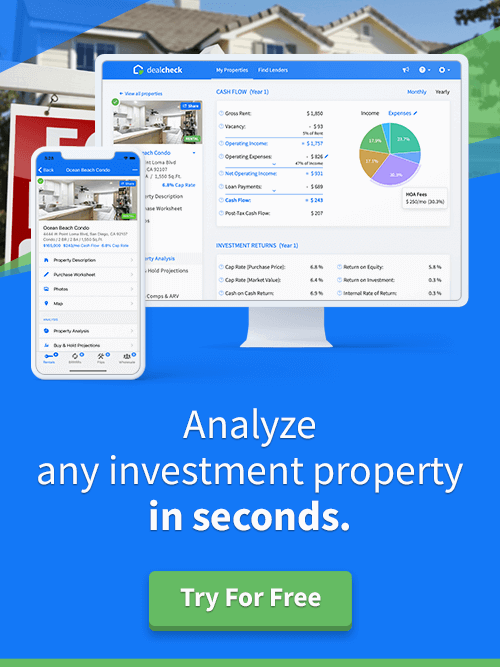The following is a post written by Catherine Way, a guest contributor to the DealCheck blog.
What is one of the most important things a real estate investor needs to know? It would have to be how to fund their real estate investments.
Learning how to pick the right loan is necessary whether you’re buying rental properties, flipping houses or investing in BRRRRs. The wrong type of funding can cut into your bottom line, or worse – cause a good deal to fall through.
In this post, we’ll explain the different funding options available to you as well as which ones may work better depending on the types of investment properties you’re buying.
The Different Types of Investment Real Estate
The type of funding that will be available to you will change depending on the type of investment real estate you’re buying. It is also important to understand that different funding options may be better suited for different types of properties.
The most popular types of real estate investments are:
- Rental Properties: Becoming a landlord can be a great way to create passive income. Buy & hold investors typically buy properties and rent them to tenants over long periods of time
- Fix & Flips: House flipping is a popular way to make a one-time profit on a property. House flippers typically find undervalued homes, make repairs to increase their value and sell them for a profit
- Land: Buying land can be a good fit if you’re willing to wait to realize a profit. Depending on your location, land can be a great way to make a large profit with minimal upkeep or maintenance
- Commercial Real Estate: Commercial real estate investments can range from apartment complexes to office buildings. While commercial real estate investing can be highly profitable, it often requires larger amounts of starting capital and experience
Once you’ve selected your investment strategy, it’s time to take a look at the available loan options to pick the one that will work the best in your situation.
Traditional (Conventional) Financing
Traditional (or conventional) loans are the most common type of financing among real estate investors due to their low rates and high availability. These are your typical 15 or 30-year mortgages that most people use to buy homes.
However, due to high regulation, traditional lenders may have stricter qualification guidelines and less flexibility than other lenders.
Here is what you typically need to qualify for a traditional mortgage:
- Credit Score: Higher credit scores usually result in more favorable terms, with a 620 credit score often being the minimum
- Sufficient Income: Traditional lenders will require proof of income, steady employment history and will often have a maximum debt-to-income ratio requirement (usually around 45%)
- Mortgage Insurance: Conventional loans with less than a 20% down payment usually require private mortgage insurance (PMI) to protect the lender in a case of a default
- Down Payment: Depending on the specific loan, a down payment will usually be required and can be as high as 20%
Traditional lenders will use the factors above to determine loan eligibility and the specific interest rate and terms of their loans. Conventional loans usually have term lengths of 15-30 years and interest rates as low as 3-4% at the time of this writing.
Lenders may have additional requirements when underwriting loans on investment properties. This may include higher down payments, higher interest rates or more strict debt-to-income ratio requirements. Lenders may also limit the total number of conventional loans an investor can have at any one time.
Nevertheless, conventional loans are a great choice for:
- Rental Properties: Conventional loans are usually the best choice when buying single-family or 2-4 unit multi-family properties, as well as vacation or other short-term rentals
- Land: Some traditional lenders will allow you to finance land purchases, although the down payment requirement and interest rates may be higher
- Fix & Flips: While you may be able to finance the actual property purchase with a traditional loan, you will not be able to finance the rehab budget

Home Equity Loans and Lines of Credit
Many conventional lenders will also offer home equity loans or home equity lines of credit (HELOCs). These loans are usually only available on your primary residence, but allow you to tap into the equity you have in your home to finance your real estate investments.
When underwriting these loans, lenders will often look at many of the same factors as with traditional loans, including your credit score, income and debt payments. They will also often have a maximum loan to value (LTV) ratio they will allow for all loans on your residence.
If you qualify, home equity loans and HELOCs can be a great way to fund almost any type of investment property, as there are typically few restrictions on how you can use the money. You can even use them in combination with other types of financing, for example, to help you come up with the down payment on the primary loan.
Hard Money and Private Money Loans
Hard money and private money lenders offer asset-based loan programs that often offer more flexibility than traditional financing. They often require less paperwork and can be underwritten much faster.
Hard money lenders usually look at the property’s purchase price and the after repair value (ARV) when underwriting loans, and less so at your personal income and credit score. Unlike traditional loans, these loans can also be used to finance both the purchase and rehab of investment properties.
To qualify for a hard money or private money loan, you will typically need:
- Investment Plan: This is a document that outlines exactly what your plan to do with the property, including its purchase price, rehab budget and after repair value, complete with supporting documentation
- Personal Financial Statement: Some hard money lenders may want to see your personal financial statement that outlines your assets and liabilities to prove that you’re a serious investor with adequate capital and reserves
Some of the disadvantages of hard money and private money loans are higher underwriting costs, much higher interest rates and shorter loan terms. Interest rates for hard money loans can range from 12-16% and the loan lengths are usually 6 months to 2 years.
These types of loans are best suited for the following investment purchases:
- Fix & Flips: Hard money loans are a favorite among house flippers, as they offer flexible terms, fast underwriting and can help them finance both the purchase and rehab budgets
- Rentals Properties: Although not as common as traditional loans, hard money loans can still be used to finance rental properties, especially if you’re following a buy, rehab, rent, refinance, repeat (BRRRR) approach
- Land: Some hard money lenders can finance land investments, depending on what you plan to do with it
- Commercial Real Estate: Depending on the scope of the project, you may be able to use a hard money loan to provide rehab or bridge financing for commercial real estate transactions
Commercial Financing
Commercial lenders typically work exclusively with commercial real estate purchases and provide loan programs designed specifically for these types of deals. They are often your only choice, as other lenders will not work with these investments.
Commercial loans can be used to purchase or renovate large projects like apartment buildings, warehouses, storefronts, storage units, retail and office spaces.
To qualify for a commercial property loan, you will typically need:
- Investment Plan: Similar to hard money lenders, commercial lenders base their loans on the asset you’re financing and will want to see a detailed description of the property, the rehab scope of work and operating proforma
- Business Financial Statement: Most commercial loans are underwritten to a legal entity, as opposed to an individual, and your lenders will likely want to see the current balance sheet and operating statement of that entity
- Personal Financial Statement: Most commercial lenders will want to see your personal financial statement that outlines your assets and liabilities to prove that you’re a serious investor with adequate capital and reserves
Although commercial lenders can be flexible, they will often have a thorough set of internal criteria and guidelines that they follow when underwriting loans. You should be prepared to submit a detailed packet of documents for the lender’s review.
Commercial funding is often used for:
- Commercial Properties: These include apartment complexes, retail spaces, office building, industrial and other commercial properties
- Residential Multi-Family Properties: Some commercial lenders may be willing to finance 2-4 unit residential multi-family properties, especially if they are bought as a package of 10+ units
- Land: Commercially zoned land can often be purchased with commercial financing as well

The Best Financing Options for Your Investments
Choosing the right financing option for your real estate investments will likely be one of the most important steps in your due diligence and closing process. When making the choice, it’s important to understand your acquisition, rehab, operation, and exit strategies.
Traditional loans are often your best bet for funding residential rental properties due to their high availability, low-interest rates and long terms. You can also consider a home equity loan or a line of credit on your personal residence to help you come up with the down payment or rehab capital.
You will most likely use hard money or private money loans to fund flips and BRRRRs due to their flexibility and asset-based underwriting. Just make sure to account for any potential underwriting fees and ongoing monthly payments ahead of time using a property analysis platform like DealCheck.
And finally, commercial financing is usually the best (and often the only) choice when investing in commercial real estate.

Catherine Way is a writer for business, mortgage and real estate industries. She has written for Silver Doctors, The Paper Source, Active Rain and Progressing Income, and currently writes for Prime Plus Mortgages, a hard-money lender in Arizona.


